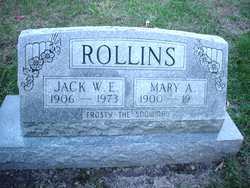Xmas number two . . .
2 Frosty The Snowman Jan Garber Orchestra
A kind of sequel to the original version of the following track. In 1949, Gene Autry — the movie cowboy known as ‘the tuneful cowpuncher’ — had a hit with Rudolph The Red-Nosed Reindeer (see below). Frosty The Snowman was that song’s 1950 follow-up. It was written, as a children’s song, by Steve Nelson (lyrics) and Jack Rollins (music), professional songwriters who bounced from Tin Pan Alley to the country music world, successfully if not spectacularly.
Nelson was a New Yorker. As a younger man, he wrote with Fred Coots, author of Santa Claus Is Coming To Town. Later in life, he was an early inductee in the Nashville Songwriters Hall of Fame.The year before Frosty, he had a seasonal hit with country star Eddy Arnold, Will Santy Come To Shanty Town? He and Rollins also wrote the official song of the US Forestry Department, Smokey The Bear.
Frosty was their big hit. Rollins’ gravestone, in his hometown, Keyser, West Virginia, even has ‘Frosty The Snowman’ chiselled into it — no more than that, no explanation, no context, just the name of the song that paid for the stone and is still providing for his descendants.
The best known version, in the US anyway, is by Jimmy Durante. There are many, many others, though. Somehow, all of them manage to sustain the willed innocence of the writers’ original intentions — even the ones created by the decidedly unworldly. Phil Spector’s relentless production for the Ronettes, for example, or Leon Redbone and Dr John’s typically sly reading of it.
This version, in which the vocals don’t come in till half way through, is by Jan Garber, a mid-century bandleader from Philadelphia, known for making the sweetest of sweet big band music. ‘Lookie, lookie, here comes cookie’ was a typical line from one of his songs. You can’t hear his Frosty without thinking of white ties and Martinis — or Bob Hoskins in Dennis Potter’s Pennies From Heaven. He was billed as ‘Idol of the Airlanes’ — I guess that referred to radio rather than powered flight. It is — probably — a BBC radio broadcast from December 1954.
Next up, tomorrow Rudolph: a dying wife, an unpleasant brother-in-law and Sinatra's favourite arranger





No comments:
Post a Comment